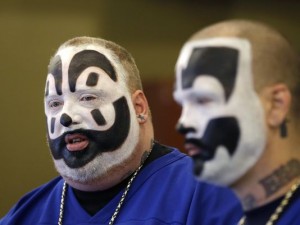
Soldier, recruit part of Insane Clown Posse lawsuit
One active-duty soldier and one man who believes he was wrongfully denied entry into the Army are among six “Juggalos” who have taken the Justice Department to court, claiming they and other supporters of the rap duo Insane Clown Posse have been illegally harmed by an FBI report identifying the Juggalos as a “hybrid gang.”
A federal judge in Detroit dismissed the case in 2014, but lawyers for the plaintiffs, in a suit backed by the American Civil Liberties Union of Michigan, appealed the ruling. Oral arguments were made June 18 in a federal appeals court in Cincinnati, which is considering the case.
At issue: Whether the gang designation in a 2011 report — “National Gang Threat Assessment: Emerging Trends” — unfairly categorizes the rappers’ fan base as a criminal element. By using the “hybrid gang” label, the government is illegally “subjecting them to significant harm, including repeated police harassment and denial of employment,” according to the complaint.
That’s where the Army comes in. While the military is not part of the suit, one soldier, Sgt. Robert Hellin, claims in court filings that his Juggalo status, confirmed by multiple tattoos, “places him in imminent danger of suffering discipline or an involuntary discharge from the Army.”
Hellin serves with 2nd Combat Aviation Brigade at Joint Base Lewis-McChord, Washington, according to Army Human Resources Command. He and the other five plaintiffs, which include the ICP rappers Joseph “Violent J” Bruce and Joseph “Shaggy 2 Dope” Utsler, were not made available by the ACLU of Michigan for interviews.
Another plaintiff, Scott Gandy, claims he attempted to enlist in the Army in 2012 but was told he could not because of his ICP-related ink. Gandy spent more than $800 to have the tattoos altered, according to case information posted on the ACLU of Michigan’s website, but was denied enlistment anyway.
The Army does not have a specific Juggalo-related tattoo policy for its potential recruits, said Kelli Bland, chief of public affairs for Army Recruiting Command. Army regulations ban members of gangs or extremist groups from joining, Bland said, but the service “does not maintain a list of criminal gangs for use by accession agencies,” and the evaluation of any group’s gang or extremist status is part of the review process for each individual applicant.
For soldiers like Hellin already in service, Army Regulation 670-1, which governs tattoos and other appearance standards, doesn’t mention gangs, but does ban tattoos “affiliated with, depicting, or symbolizing extremist philosophies, organizations, or activities,” including groups that “advocate violence or other unlawful means of depriving individual rights under the U.S. Constitution.”
Four states considered the Juggalos a gang as of 2011, according to the threat assessment. A 2013 report by the National Gang Intelligence Center, the same group behind the 2011 effort, lists hundreds of gangs but does not mention the Juggalos, nor the notion of “hybrid gangs,” defined in 2011 as “non-traditional gangs with multiple affiliations.”
Because of the designation, the complaint states, “state and local police routinely stop, detain, interrogate, photograph and document people like Plaintiffs, who do not have any connections to gangs, because they have exercised their First Amendment rights to express their identity as Juggalos by displaying Juggalo symbols. Other Juggalos, including plaintiff Scott Gandy, have been denied consideration for employment because of the gang designation.”
ICP 101
Violent J and Shaggy 2 Dope have been performing, mostly in trademark clown makeup, for more than 25 years. What started as a collaboration on the Detroit rap scene became a community with much wider and deeper interests than typical music fan bases. The group holds an annual “Gathering” for its fans (this year’s four-day festival is in Ohio in July), the rappers host a music-video show on the Fuse cable network, and the Juggalo Championship Wrestling promotion has toured the country since 1999.
The 2011 threat assessment includes reports of a 2010 shooting and a 2011 robbery attributed to Juggalos. ICP fans allegedly threatened business owners in Portland, Oregon, in 2014, and the yearly gatherings have been marked by multiple arrests and deaths.
The assessment states that “[t]ransient, criminal Juggalo groups pose a threat to communities due to the potential for violence, drug use/sales, and their general destructive and violent nature.”
A lawyer for the Juggalo plaintiffs disputed these findings in appeals-court arguments.
“There is no data to support a broad-ranging finding that this group is engaged in criminal activity, because they’re not,” Saura Sahu told the court June 18. “Their primary purpose is to be music fans, and the vast majority are law-abiding people.”
Sahu, who did not return emails seeking comment, told the court that the report amounted to “erroneous blacklisting.” Two other lawyers on the case also did not respond to emails, and Darrell Dawsey, communications director of the ACLU of Michigan, refused to answer questions on the case.
Lawyers for the Justice Department say the report does not require law enforcement agencies or government employers, such as the Army, to take any actions based on its findings, nor does it paint with the broad brush described by the ICP’s lawyers.
“FBI has nowhere stated that all Juggalos are criminals, or all Juggalos are gang members,” Justice Department lawyer Lindsey Powell told the appeals court.





Leave a Reply